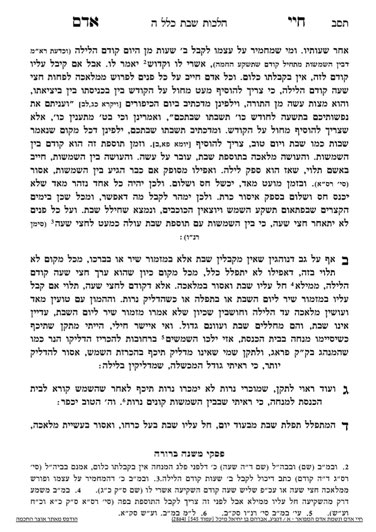We are continuing in siman 2. We will not read the remainder of the siman inside, but essentially the Chayei Adam strongly admonishes people who continue to do melacha until late on erev Shabbos. He continues his admonishment in siman 3 as well.
We need to clarify a question. We learned that one can rely on the opinion that tosefes Shabbos is a short amount of time before shkia, even though there are opinions that it is longer. Rav Moshe follows the calculation that it is a few minutes, and the Shulchan Aruch Harav similarly says it is four minutes.
The question comes up regarding tosefes Shabbos and mincha. This question is often not relevant in the summer, where there is plenty of time to daven mincha before sunset. In the winter, many shuls will daven mincha very close to sunset, and will only finish mincha after sunset. If so, it would appear that those individuals have lost out on the opportunity to fulfill tosefes Shabbos (at least, according to the Geonim). Is there a conflict between tosefes Shabbos and mincha, or maybe one can accept tosefes Shabbos and then daven mincha afterwards?
The Mishnah Berurah does not discuss this point regarding mincha, but does discuss it regarding hadlakas neiros. He writes that once a woman has lit the Shabbos candles, she has accepted Shabbos and is no longer able to daven mincha. Therefore, he writes that a woman should be careful to daven mincha before hadlakas neiros, but if it is getting late, she should light the neiros and daven maariv twice. The question is whether this Mishnah Berurah can be applied to tosefes Shabbos as well.
According to the Chayei Adam, that tosefes Shabbos occurs automatically, the primary application of tosefes Shabbos is the requirement to refrain from melacha. If so, maybe it could be argued that davening mincha is not a contradiction to tosefes Shabbos. However, if tosefes Shabbos requires a verbal declaration, arguably it would appear as a contradiction to mincha.
The Shmiras Shabbos Kehilchasa writes that based on the Mishnah Berurah, if one is in a situation in which they can either fulfill tosefes Shabbos or daven mincha, they should fulfill tosefes Shabbos and daven maariv twice. However, others disagree and hold that one should make a stipulation that if accepting tosefes Shabbos is not a contradiction to mincha, they accept tosefes Shabbos before mincha. If it is a contradiction, they do not accept tosefes Shabbos until immediately after their silent shemoneh esrei (even before chazaras hashatz, etc). Arguably, one can make such a stipulation on every erev Shabbos, but it is preferable to daven mincha with a minyan which davens earlier, in a way which leaves time for a proper kabbalas Shabbos.
In the next few simanim, we will come back to discussing the method through which one accepts tosefes Shabbos.
Summary
If one is caught between accepting tosefes Shabbos and davening mincha, they should make a stipulation that if accepting tosefes Shabbos is not a contradiction to mincha, they accept tosefes Shabbos before mincha, and if it is a contradiction, they do not accept tosefes Shabbos until immediately after their silent shemoneh esrei



